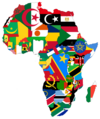Related Research Articles
A journalism school is a school or department, usually part of an established university, where journalists are trained. 'J-School' is an increasingly used term for a journalism department at a school or college. Journalists in most parts of the world must first complete university-level training, which incorporates both technical skills such as research skills, interviewing techniques and shorthand and academic studies in media theory, cultural studies and ethics.
Higher education in Mauritius includes colleges, universities and other technical institutions. Public university education has been free to students since 2019. The sector is managed by the Higher Education Commission (HEC) which has the responsibility for allocating public funds, and fostering, planning and coordinating the development of post-secondary education and training. Formerly the Tertiary Education Commission, in 2020 it was reformed into the HEC and a separate Quality Assurance Authority (QAA) for auditing of qualifications.

Ashesi University is a private, non-profit university located in the hills of Berekuso, overlooking Ghana's capital Accra. The mission of Ashesi University is to educate ethical, entrepreneurial leaders in Africa; to cultivate within students the critical thinking skills, the concern for others, and the courage it will take to transform the continent.
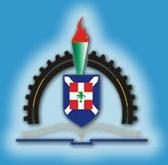
The Presbyterian University, Ghana is a partially private & public university with multi- campuses and its headquarters located at Abetifi-Kwahu in the Eastern Region of Ghana. It is one of the new universities in Ghana granted accreditation by the Ghana Tertiary Education Commission – GTEC. It was established by the Presbyterian Church of Ghana (PCG) on 23 November 2003 and inaugurated on 27 March 2004 by the president of Ghana in that republic, John Agyekum Kufuor.
The Pentecost University is a private university located at Sowutuom in the Greater Accra Region of Ghana. It was founded by The Church of Pentecost (COP) and evolved from The Pentecost Bible College which initially trained only Lay Leaders and full-time Ministers for the COP. On May 22, 2003, J. A. Kufuor, the former President of Ghana, inaugurated PUC at the Sowutuom campus. The first PUC Council was inducted on May 6, 2004. Pentvars was accredited by the National Accreditation Board (NAB), Ghana in November 2004 and awarded its Presidential Charter on May 28, 2020, by Nana Addo Dankwa Akufo-Addo, the President of the Republic of Ghana. Prior to receiving a Presidential Charter, the university was affiliated to the Kwame Nkrumah University of Science and Technology, University of Cape Coast, and University of Ghana. On June 1, 2020, the university announced the appointment of Rev. Prof. Kwabena Agyapong-Kodua, who replaces Apostle Daniel Okyere Walker, as the first Vice-Chancellor since the university became fully-fledged.

CIMBA Italy is a study abroad program in Italy that offers study abroad and degrees for undergraduate, MBA, and Executive-level students. Coursework focuses on American-style learning in business, leadership, journalism, communication, and engineering. CIMBA has a campus in Paderno del Grappa in the Veneto region of northern Italy.
The University College of Management Studies is a private university college in Accra and Kumasi, Ghana. The school is affiliated with the School of Business of Kwame Nkrumah University of Science and Technology, Kumasi and the University of Education Winneba, Kumasi Campus.

The National Accreditation Board (NAB) of Ghana is the Government of Ghana agency responsible for the regulation, supervision and accreditation of tertiary institutions in Ghana. It is an agency under the Ministry of Education.
Takoradi Technical University is a public tertiary education institution (university) located in Sekondi-Takoradi, the capital of the Western Region of Ghana. Takoradi Technical University was established as a Government Technical Institute in 1954, and became part of the State Tertiary Education System. Later after the passage of the Polytechnic Law of 1992. It was replaced by Polytechnics Law in 2007. In 2016, the Bill to convert six out of the 10 polytechnics into a fully fledged university received a unanimous approval of Ghanaian legislators.
The Kumasi Technical University, formerly known as Kumasi Polytechnic, is a public tertiary institution in the Ashanti Region of Ghana.
The Nursing and Midwifery Training College, Korle Bu, the premier institution in Ghana for nursing education, is located in Korle Bu in Greater Accra. The establishment of the college in 1945 was supervised by Agnes Yewande Savage, West Africa's first woman doctor. The college is a public health training institution, and it is supervised by the Ministry of Health, Ghana (MoH).
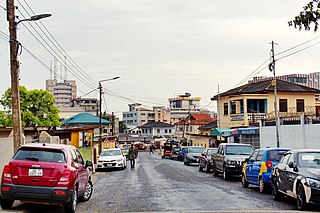
Adabraka is a town in the Korley Klottey Municipal Assembly, a Municipality of the Greater Accra Region of Ghana. It was the first and the most posh neighborhood in Ghana during the British era.

The University of Media, Arts and Communication (UniMAC-GIJ), formerly the Ghana Institute of Journalism (GIJ), is a public university in Ghana. The institute is accredited by the National Accreditation Board.
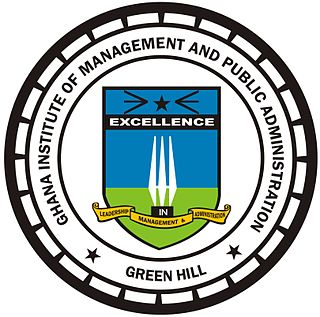
The Ghana Institute of Management and Public Administration (GIMPA) is a public co-educational university spread over four campuses and made up of six schools, ten research centers located at Greenhill in Accra, Ghana. The location of GIMPA, Greenhill, was named by Nicholas T. Clerk who served as the Rector of the institute from 1977 to 1982. The name, "Greenhill", is a reference to the lush greenery and hilly topography of the main campus, as well as its location in Legon which was historically on the periphery of the Ghanaian capital, Accra. Together with 200 state institutions, GIMPA successfully participated in a Public Sector Reform Programme under the auspices of the World Bank and became a self-financing institution as part of the National Institutional Reform Programme in 2001.

The Accra Institute of Technology (AIT), is an independent technology-focused research university based in Accra, Ghana. The university comprises six schools and three institutes.

The University of Professional Studies, Accra (UPSA) formerly known as Institute of Professional Studies (IPS), is a public university in Ghana. The main campus is located in Accra. UPSA is the first university in Ghana to provide both academic and business professional education. The University of Professional Studies Act, 2012 (Act 850) changed the name of the Institute of Professional Studies to University of Professional Studies, Accra. UPSA is nationally and internationally accredited by the National Accreditation Board (Ghana) and the Accreditation Council for Business Schools and Programs (ACBSP) respectively.
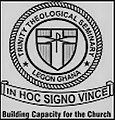
The Trinity Theological Seminary is a Protestant seminary located on a 70-acre campus in Legon, Accra. As an ecumenical theological tertiary and ministerial training institution, it serves students in Ghana and the West African sub-region. The focus of the curriculum is pedagogy, guidance and counselling and fieldwork to adequately prepare students for careers in Christian ministry. The school has Charter status and offers certificate, diploma and degree programmes and is accredited by the National Accreditation Board of the Ghanaian Ministry of Education.
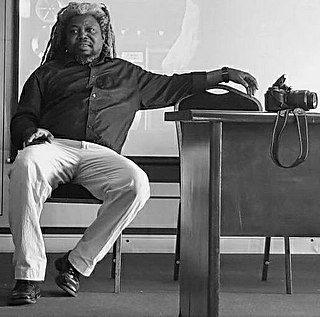
Nana Sandy Achampong is a Ghanaian media practitioner, novelist, poet and educator. He has worked in the fields of journalism, public relations, advertising, marketing, the visual arts and literature in Ghana, the United Kingdom and the United States. He is an author with books that cover the different genres of poetry, play, for children, fiction, non-fiction, Christian, media and anthology. He currently teaches at the African University College of Communications, where he is also the Director of the Ama Ata Aidoo Centre for Creative Writing.
Sangmorkie Tetteh is a Ghanaian media personality. She was the Deputy News Editor at TV Africa and also hosted the station's major English bulletin – News Hour until she resigned. Sangmorkie has worked with other media houses including Ghana Broadcasting Corporation (GBC), Choice FM, TV3, GHOne and TV Africa.
References
- ↑ Nature of Communication Program Archived 23 July 2013 at the Wayback Machine . aucc.edu.gh.
- ↑ Centre for African Studies. aucc.edu.gh.
- ↑ African University College of Communications: Faculties and courses Archived 22 July 2013 at the Wayback Machine . aucc.edu.gh.
- 1 2 3 African University College of Communications: Library Archived 22 July 2013 at the Wayback Machine . aucc.edu.gh.
- ↑ "AUCC, Knowledge Innovations to host first training course in Financial Technologies - MyJoyOnline.com". www.myjoyonline.com. Retrieved 19 May 2021.
